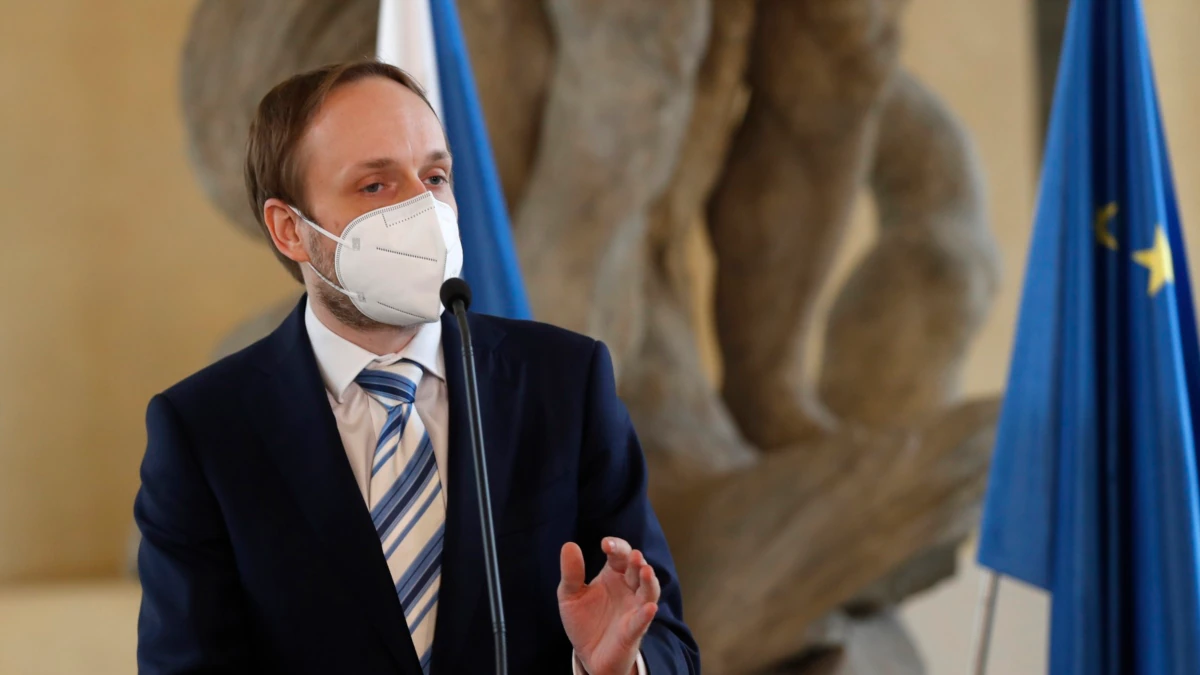
Newly appointed Czech Foreign Minister Jakub Kulhanek says dozens of staff members of the Russian Embassy in Prague will be expelled, as a noon deadline looms for Russia to allow 20 Czechs to return to work at the embassy in Moscow, a threat Russia warned would spark further retaliation.
In an interview with Lidovky.cz published late on April 21, Kulhanek said “about” 60 Russian Embassy staff will be expelled if Moscow ignores the deadline, which stems from a dispute over Moscow’s alleged role in a deadly 2014 explosion at a Czech arms depot.
On April 19, 18 Russian diplomats identified by the Czechs as being intelligence operatives were expelled from their posts in Prague, prompting Moscow to retaliate with the expulsion of 20 Czech Embassy employees in Moscow.
The Czechs said they were surprised by the size of the Russian move, which they noted would severely hamper the operations of the embassy in Moscow.
“The aim is to bring the situation at the Russian Embassy in line with that at our embassy in Moscow at the moment,” Kulhanek said in explaining the number of possible expulsions.
The tit-for-tat moves over the Czech allegations have triggered Prague’s biggest dispute with Russia since the 1989 end of communist rule, putting the small Central European NATO member at the center of rising tensions between Moscow and the West.
Russian Foreign Minister Maria Zakharova told the Vesti FM radio station on April 22 that she will speak with the Czech ambassador to Moscow, Vitezslav Pivonka, to outline “the actions that may be taken if Prague takes certain steps.”
“They need to realize what stage they have reached in terms of wrecking bilateral ties,” she added.
Kulhanek, who took over as Czech foreign minister on April 21, said in the interview that he had spoken with NATO chief Jens Stoltenberg and planned to talk with the ambassadors of NATO member countries to outline the details of the 2014 explosion in Vrbetice that killed two people in “an unprecedented encroachment on Czech sovereignty.”
“We want support regarding [the explosion in] Vrbetice. Also, we want support in the sense that Russians reacted by actually paralyzing our embassy’s operations in Moscow. We want support for this as well. I will talk about the issue with the North Atlantic Council on [April 23],” Kulhanek said in the interview.
The Kremlin has rejected Prague’s “baseless accusations” and called the Czech moves “unreasonable and harmful to bilateral relations.”
Kremlin spokesman Dmitry Peskov, commenting on Kulhanek’s interview with Lidovky.cz, said that President Vladimir Putin in his annual state-of-the-nation address on April 21 “had talked about the futility of issuing demands” against Russia.
The Czech Foreign Ministry says the number of Czech diplomats in Moscow after the expulsions sits at five, plus 19 other staff. Russia’s Embassy in Prague now has 27 diplomats and 67 other staff, according to the ministry. Both countries have additional staff at consulates in other cities.
As a result of the dispute, the Czech government has already decided to eliminate Russia’s state-run corporation Rosatom from a multibillion-dollar tender to build a new unit at the Dukovany nuclear power plant.
Interior Minister Jan Hamacek, who was acting foreign minister until Kulhanek’s appointment, said that Prague would also no longer consider buying Russia’s Sputnik V vaccine against COVID-19.
Citing Czech intelligence, the government said that Russia’s GRU military intelligence agency orchestrated the explosion in the eastern town of Vrbetice in 2014 in what the Foreign Ministry called “an unacceptable violation of the state sovereignty and national security of the Czech Republic.”
The October 16 blast set off 50 metric tons of stored ammunition, killing two people. Two months later, another explosion of 13 tons of ammunition occurred at the same site.
In connection with the October blast, Czech police said they were seeking two suspected Russian agents also identified as suspects in the 2018 poisoning of former Russian double agent Sergei Skripal in England.
However, the open-source investigation organization Bellingcat said the Russian operation that the Czech authorities had linked to the blast in Vrbetice involved at least six GRU operatives.
Prague has called on fellow EU and NATO members to show “solidarity” by also expelling Russian diplomats.
EU foreign-policy chief Josep Borrell said in a statement on April 21 that the bloc “expresses full solidarity with the Czech Republic, supports the actions taken by its authorities so far and stands ready to support its further efforts to bring those responsible to justice.”
“The EU condemns the disproportionate reaction and subsequent threats of Russian Federation towards the Czech Republic,” Borrell said. “Disruptive actions of Russian intelligence services against the interests and security of the EU and its member states will continue to be met with the staunchest resolve, including at the level of the European Union, as appropriate.”
A NATO official has said that the allies “stand in solidarity over Russia’s dangerous pattern of destabilizing behavior.”
Skripal, a former Russian military intelligence officer, and his daughter Yulia nearly died after being exposed to what British authorities later concluded was Novichok, a military-grade nerve agent. A British woman who accidentally came into contact with the substance died.
Britain’s NATO allies responded to the Skripal poisoning by imposing sanctions on Russia and expelling diplomats.
With reporting by Lidovky.cz, AFP, TASS, and Reuters
This post was originally published on Radio Free.